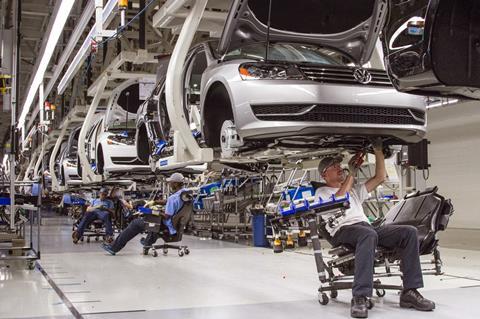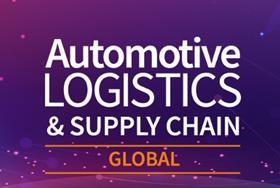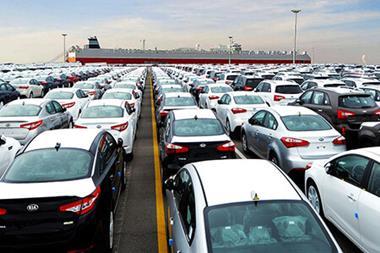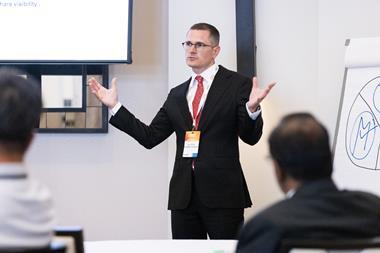The automotive supply chain has been adopting digital technologies to improve visibility, particularly in the finished vehicle logistics (FVL) sector, helping to speed up deliveries and keep costs at a minimum.
The next step for the FVL sector is process-mining, which can turn qualitative data to quantitative, measurable data, and help logistics firms become more efficient and more profitable.

In Automotive Logistics’ recent livestream, hosted in partnership with Celonis, Riad Mannan, content producer at Automotive Logistics, spoke to leaders from Toyota North America, Celonis and PwC to discuss how process-led transformation can accelerate change.
What is process mining?
Process mining, according to Celonis, is a widely-used technology to model, analyse and optimise logistics business processes. It means that every step of a business process leaves a digital footprint in the form of data, and allows firms to track the effects of changing processes on time and cost. In the FVL industry, where OEMs, suppliers and logistics firms need to react swiftly and flexibly, processes and their alignment with one another can make a massive difference in the speed of deliveries and thereby ROI and profitability.
From an FVL standpoint, there are major challenges to deal with on a daily basis, including damage prevention, transparency, regulatory compliance, timing and cost efficiency.
Brennan McKinlay, executive transformation leader, Toyota North America said that the OEM approaches these challenges through three key technology areas, including data analytics, automated solutions and tracking systems.
“We use data analytics, data mining, data science and data engineering,” McKinlay said. “Data is the currency of today and we’re trying to make good use of what we have around us and improve our supply chains. Using data wisely and using good analytics and decision-making is extremely important.”
Watch the livestream on demand now
He said that this data can then be used to help adapt processes, or even automate them. “We are automating decision-making where it’s possible so that our people can focus on the most critical issues, even automating in some cases the movement of vehicles or the movement of goods through robotics are major opportunities for us,” he said.
Defining and separating processes
Of course, before process mining can take place, standard definitions of processes need to be set and agreed upon by all stakeholders in a supply chain.

“It’s very important when taking a look at an improvement project to define what your impacts in the project will be, and to define them together with a client,” said Kenny Petzold, senior manager, Process Mining and Optimisation, PwC. “With process mining, as it connects down in real-time in the system you’re getting that real-time feedback, you’re getting insight, you’re seeing exactly whether the ‘medication’ you’re giving to your organisation is helping, or if it’s causing troubles in another domain or pushing problems away from one department to another.”
He said that process-mining can give you an end-to-end view of processes and how they interlink, making this information quantifiable so you can calculate business cases based on certain process changes and simulate the effects of adjusting them, leading to faster ROI calculations.
Julian Thomßen, global automotive and manufacturing industry lead, Celonis agreed: “We can also measure the benefit of, for example, automating some of these activities. We can identify how we can shorten lead times, how to adjust parameters that lead to better material availability or on-time delivery, so you can track what actions have been taken and what value has been realised.”
Petzold stressed that processes need to be broken down and looked at individually to get the most benefits in terms of efficiency and cost-saving. “It’s really important to come up with a qualitative hypothesis in the beginning, so come up with certain things you want to analyse, because if you don’t have those objectives set out clearly, you’re looking at a picture but seeing nothing because there is so much information,” he said. “It’s like putting a human body into an X-ray and looking at the full human instead of only the broken wrist. Although it gives you end-to-end visibility you need to slice it into digestible bits that you can analyse and then from there, go a little further.”
Preparing for process-mining
To get ready for process-mining, definitions and standards need to be set, but also, Toyota’s McKinlay highlights that data needs to be clean and shared across the business, with clear data governance.
“Data governance is critical, because partners like Celonis are doing an excellent job where data may be unstructured or there may be some inconsistencies, but there’s a lot of work to be done to bridge gaps and a lot of other companies are not quite at that level yet,” he said.
“We need to make sure that business data governance is done really well to gather information and make sure the data is clean. It’s important that we break silos and create value across the whole data stream.”
Julian Thomßen, global automotive & manufacturing industry lead, Celonis will be speaking on a panel at the upcoming Automotive Logistics & Supply Chain Global event with experts from Ford, RPM and Cognosos, discussing precision finished vehicle logistics.
The event will run from September 24-26 in The Henry Hotel, Dearborn, Michigan.
Topics
- Digitalisation
- Editor's pick
- Emergency logistics
- Finished Vehicle Logistics
- Inventory management
- Lean Logistics
- Lean Transformation
- Materials handling
- News
- North America
- OEMs
- Policy and regulation
- Ports and processors
- Rail
- Road
- Shipping
- Supply Chain Planning
- Sustainability
- Technology service providers
- Top stories
- Toyota


























![Global[1]](https://d3n5uof8vony13.cloudfront.net/Pictures/web/a/d/s/global1_726550.svgz)














No comments yet